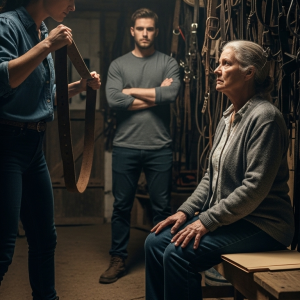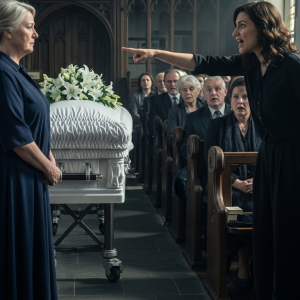When my only grandson got married, I stayed silent. I didn’t mention the $55 million I held in trust for him, a legacy from the parents he’d lost so long ago. They seated me at a corner table, tucked behind a thick column where the servers seemed to forget I existed. I watched him toast his bride, Sierra, as she whispered to a bridesmaid that I was just the old woman who raised him.
That night, they left me waiting outside in the cold for a ride that never came. I didn’t cry. I didn’t raise my voice. I simply smiled. But what happens when the woman they chose to bury in silence is the one who holds the key to everything they desire?
I sat in the very last row of the ceremony. Not because I was late; I had been there since morning, helping a florist who mistook me for venue staff. It was Brennan’s day, and I refused to make a fuss. The sun was warm over Carmel Beach, casting a gentle glow on the white linen chairs and blush flowers. Every seat had a name card. Mine did not.
An usher pointed vaguely toward the back. I sat without a word. Sometimes, silence is a protest far louder than any shout. Brennan stood at the altar, handsome in his custom blue suit. My heart ached looking at him, the boy I had raised since he was eight, after the crash that took his parents. It was just the two of us against the world. I packed his lunches, sat through his dental appointments, and stayed up all night helping with his college essays.
Yet here I was, a ghost at his wedding. When he took the microphone to thank those who shaped him, he named his coach, a college mentor, even Sierra’s mother. He paused, scanned the crowd, and moved on. There was no mention of me.
Sierra, radiant in her designer gown, leaned over during the ceremony. She touched my shoulder, her smile crafted for a camera, and whispered, “It’s just so special that you’re here, Miss Forsythe.” Not Grandma. Not even Marlene. Just a formal, dismissive title.
I nodded, smiled, and clapped at all the right moments. I even helped gather gift bags as guests moved toward the reception. The table marked for grandparents, near the happy couple, had a seat for Sierra’s grandmother. The other chair, meant for me, remained empty. Brennan didn’t seem to notice. Or perhaps he did.
I stayed until the last dance, slipping away as the DJ played their song. No one waved goodbye. Driving home, one hand on the wheel, the other clutching my purse, I tried not to cry. But the quiet tears came anyway, the kind that make your chest ache with a hollow emptiness. If you’ve ever been forgotten by the one person you love most, you understand that kind of silence.
But that was just the beginning. Something far worse was waiting for me, hidden inside a leather folder on a cold marble table. Something with my name and a signature I never gave.
Three days after the wedding, Brennan called. He asked if I could stop by their new place in Pacific Grove, saying there were a few estate matters to discuss. His tone was smooth, polite. I told him I’d bring lemon bars.
Their condo was modern and cold, a sterile showpiece from a lifestyle magazine. Sierra opened the door, her smile failing to reach her eyes. She wore a beige outfit that looked like it was curated for an Instagram post. Everything about her felt staged.
Brennan was in the kitchen. He didn’t hug me; he just motioned toward the marble island where a sleek black folder waited. I set the lemon bars beside it. No one touched them.
“We’ve been going over the finances,” he began, still not looking at me, “and we want to streamline things for the future. The trust needed a small update. Nothing significant, just some signatures to make the process smoother for everyone.” He finally looked up. “It would be easier if Sierra and I had decision-making authority. You know, since you might not want the stress of managing all that money at your age.”
He chuckled as if we were sharing a simple joke over coffee. He opened the folder and slid the papers toward me. I didn’t touch them immediately. The top page was labeled “Trust Reassignment Addendum.” Having managed estates at the nursing home for years, I knew the corporate language was too smooth, too practiced.
I flipped through the pages slowly. On the third page, I froze. My name was there. My signature. A perfect, precise copy of my handwriting, the way I signed every birthday card and letter. But it wasn’t mine. My stomach dropped into a cold knot.
I looked at Brennan. He was watching me, his face a careful, unreadable mask. Sierra was scrolling on her phone, sipping her drink as if this were the most normal conversation in the world. I closed the folder gently. “I’ll need some time to review this.”
On the drive home, that forged signature burned in my mind. By the time I reached my driveway, I wasn’t confused. I was angry. It wasn’t a loud, shaking rage, but a quiet, measured anger, the kind that lets you sleep soundly but wakes you at 4 a.m. with absolute clarity. Someone had forged my name. This wasn’t a simple trick; it was a meticulously crafted plan.
I didn’t sleep. I sat at my dining table, the forged documents in front of me, the betrayal a cold weight in the room. This was theft, dressed up in a smile and a tailored suit.
Around 3 a.m., I went to the closet in the spare room. Inside was an old metal filing box my son, Mark, had given me after the funeral. His lawyer said it contained documents, instructions for an emergency. In my grief, I had tucked it away and focused on raising Brennan.
The lock clicked open. Inside, one manila folder was labeled with Brennan’s full name. Nestled between school records was a navy-blue envelope with my name in Mark’s familiar script. My hands trembled as I slid the letter out. It was short, just like him.
If Brennan ever turns, you’ll know. The original trust is on the USB. You are the sole trustee. You decide everything. Protect him if you can, but protect yourself if you must.
Tucked beside the letter was a small, blue USB drive. I booted up my old laptop. A folder labeled “FOR MOM” popped up. Inside were the original, notarized trust documents. My name was listed as the sole trustee, with full discretion until Brennan reached the age of thirty. Not twenty-four. Not when he married Sierra.
And then I saw the clause I never knew existed: Distribution of any assets is contingent upon the heir demonstrating maturity, gratitude, and a continued relationship with the appointed guardian.
I leaned back, the truth settling over me. Mark hadn’t just trusted me to raise his son; he had trusted me to guard their family’s legacy. He had seen the potential for this, and he had built a fortress around it to protect us both. As the sun rose, I knew for the first time since that cold wedding day exactly what I was going to do.
The next morning, I called Evelyn Doss, our former estate lawyer. She was retired now, growing heirloom tomatoes, but her mind was as sharp as ever. I told her I needed a second opinion on a document. She simply said, “Bring everything.”
Her kitchen smelled of rosemary and coffee. She put on her reading glasses and examined both versions of the trust, line by line. When she finished, she tapped the forged document. “This is a problem. The signature page isn’t properly witnessed, the notary seal is a digital copy and it’s expired, and the formatting is sloppy.” She looked at me over her glasses. “And that’s not your signature.”
She laid out my options. I could go to court, a public and ugly battle that could result in criminal charges for Brennan. Or, I could use what I knew to apply pressure quietly, file a notice of fraud to freeze the assets, and gather more proof. I asked if she would be my counsel again. She smiled. “I’ve been waiting for something interesting to do.”
I went home with a plan. In my safe was a tiny voice recorder Mark used to use. I charged it. That weekend, Brennan called again, his voice syrupy sweet, asking if I’d reviewed the paperwork. He mentioned Sierra’s cousin, an “estate planner,” could help. I agreed to come over Sunday.
I walked into their condo with a Tupperware of potato salad and the recorder active in my purse. They laid out the same documents. This time, Sierra did most of the talking, using words like “streamlining” and “long-term vision.”
Calmly, I asked about the notary, the missing witnesses, the expired digital seal. Brennan’s smile faltered. Sierra cut in, her voice a little too bright. “Oh, that was all handled by a paralegal friend of my cousin’s. He’s on sabbatical out of state right now, completely off the grid. But I assure you, it’s all standard.”
I let her finish, then smiled. “I see. Well, I’ll need a statement with all of those details in writing, of course.” The recorder clicked off in my purse two minutes later. Back home, I backed up the audio on three separate drives. They had no idea what was coming.
On Monday morning, I made two stops. First, I sent certified copies of the audio and both trusts to a secure box Evelyn had set up. Second, I went to the County Registrar’s Office.
The woman behind the glass window looked up as I slid the folder toward her. “I need to file a notice of suspected fraud related to a living trust.” Her smile didn’t waver, but her hands paused. Twenty minutes later, a supervisor appeared.
He told me the process would trigger an internal review, and the estate would be frozen until the dispute was resolved. No changes, no disbursements, no activity. “That will be fine,” I said.
That afternoon, I began listing every inconsistency, every lie. I also sent a scanned copy of the forged signature to a document verification expert. While I waited, I went through Mark’s old financial records. In a folder labeled “Future Considerations,” I found an unsent letter to Brennan.
Mark had written about the weight of their legacy, that the money was meant to be handled with humility and respect, not to buy attention. He had intended to pass it on, but only when Brennan proved he understood.
Late that evening, Evelyn called. The expert had flagged the signature as “highly suspect.” The evidence was mounting. This was no longer just about betrayal. It was about preserving the values Mark had cherished. And it was time Brennan learned that the line had been crossed. The house was silent, and I waited.
Two days later, Brennan showed up unannounced. He gave me the tired smile he always used when trying to disarm me. He said Sierra was worried about me. He stayed standing while I sat at the table.
He gestured to the folder. “I understand the paperwork might have been overwhelming. We never meant to rush you. This isn’t about cutting you out; it’s about making things more efficient for our future.”
I met his gaze. “Is this what your father would have wanted?”
He didn’t answer. Instead, he pulled a thick envelope from his coat. “This is a revised copy. Something more in line with what we all originally agreed to. Consider it a show of good faith.”
After he left, I opened it. It was a more polished forgery, the lie now better dressed. I called Evelyn, who advised me to let them continue building their own trap. That night, I made a new list—a list of things they didn’t know.
They didn’t know the estate was frozen. They didn’t know about the recordings. And they certainly didn’t know that Mark’s trust had empowered me to rewrite the final clause. I had already filed that clause a day earlier. It placed a temporary lock on all distributions for the next five years, unless I, the trustee, determined otherwise. They were playing a game, but I had written the rulebook.
A week later, a wedding invitation arrived. Brennan and Sierra were hosting a lavish reception for her family at a vineyard. A handwritten note was at the bottom: We hope you’ll say a few words. It wasn’t an olive branch; it was a test. They thought I was the same quiet, forgiving woman, desperate for their approval. But I had changed.
I pinned the invitation to my fridge. I was going. Not to make a scene, but to observe. I arrived at the vineyard in a modest navy dress. Sierra rushed over, all performance and sharp perfume, and sat me with relatives who had never heard of me. There was no request for a speech. I just smiled, ate my salad, and watched their carefully constructed play unfold.
Three days after the reception, a certified letter arrived from a Sacramento law firm. They were formally challenging the trust. This was Sierra’s move, an escalation from manipulation to open warfare. Evelyn confirmed the lawyer specialized in high-value estate disputes.
Evelyn drafted a response. It politely declined their request, attached documentation proving the forgery, and noted that any future correspondence would be routed through legal counsel, with a potential criminal review under consideration. I signed it without hesitation.
A week later, I invited Brennan and Sierra for breakfast. No lawyers, just clarity. They arrived late, tense. We sat at the dining table. I let the silence stretch before I spoke.
“I have reviewed everything,” I began, my voice calm and steady. “I know exactly what you attempted to do. The original trust remains legally intact. All attempts to alter it are invalid and now part of an official record.”
I looked directly at them. “I know about the forgeries—both versions. I have evidence, verified by professionals. The Registrar has frozen the estate, and your new law firm has received our notice.”
Brennan went pale. Sierra’s jaw tightened.
“But I am not pressing charges,” I said. They both looked stunned. “What I care about now is precedent. The trust will remain under my control for the remainder of my life. The clause freezing all distributions for five years is in place. Any future considerations will be evaluated on merit, not entitlement.”
I locked eyes with my grandson. “Love isn’t transactional, Brennan. And respect is not inherited with dollars.”
I then told them I was restructuring a portion of the estate into a foundation to honor Mark’s values—care, community, accountability. Brennan asked who would run it.
“I will, for now,” I replied. “And then a board of trusted individuals, chosen not by bloodline, but by character.”
Sierra stood up, her face a mask of fury. Brennan followed. They left without another word. The truth had finally been spoken. Not with fire, but with finality.
In the quiet weeks that followed, I moved forward. With Evelyn’s help, I drafted a charter for a community trust to fund caregiver scholarships and support elder care initiatives. It would be funded by the assets Brennan believed were his. I named it The Elise Foundation, after my own grandmother.
News of the foundation spread through the community. One day, a package arrived. Inside was a typed letter from Brennan and a check. The letter spoke of mistakes, of pride, of decisions influenced by fear. It wasn’t a true apology, but it was a beginning. The check was for $100,000, made out to The Elise Foundation.
That night, I walked to the harbor and sat on the bench where Mark and I used to share ice cream. He once told me that money was a tool—a hammer in the right hands, a weapon in the wrong ones. I hadn’t become smaller or meaner in this fight. I had simply learned to wield the right tools. This was never about money. It was about the legacies that aren’t written in a will: kindness, boundaries, and decency.
By winter, the foundation held its first event, a small gathering for women who had fought their own silent battles. We didn’t offer solutions; we offered presence. That was enough. The house was quieter than ever, but it no longer felt empty. It felt steady. It felt mine.
On Christmas Eve, I lit a single candle in the window. A small flame for the woman I used to be, for the one who stayed quiet for too long, and for the one who finally found her voice. I wasn’t bitter or proud. I was simply whole.
If you have ever felt like your voice didn’t matter, know that silence is not the end. It is simply the space before you choose yourself again. You are not alone.




